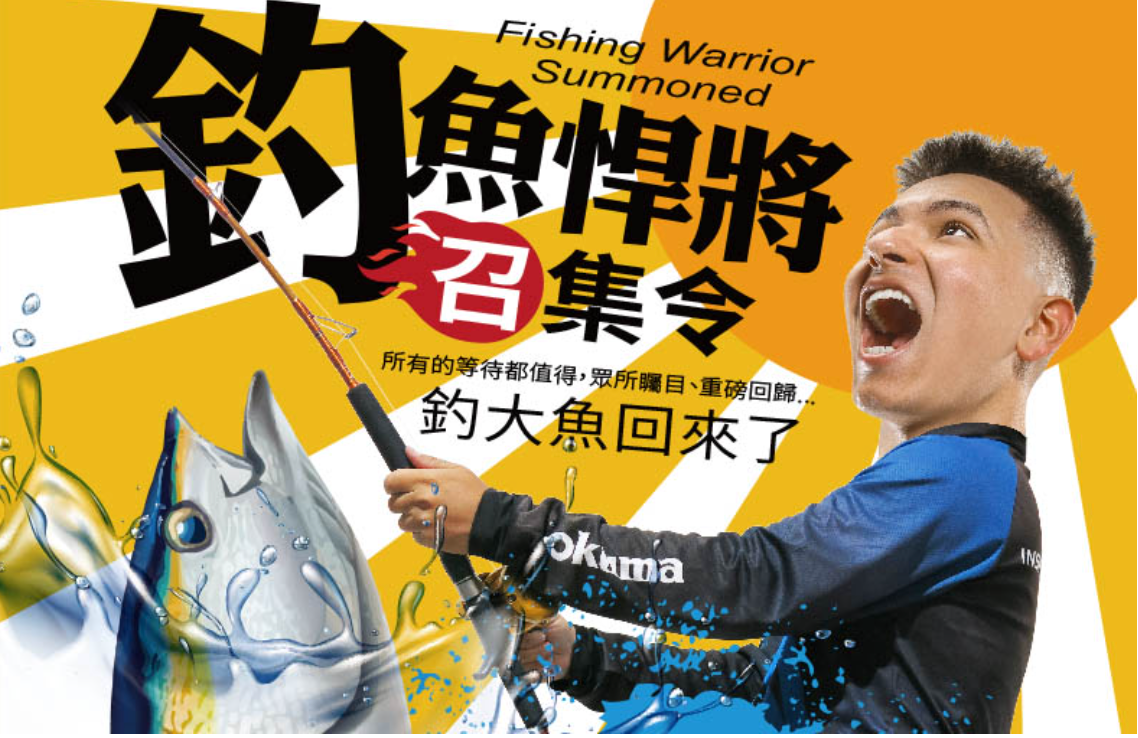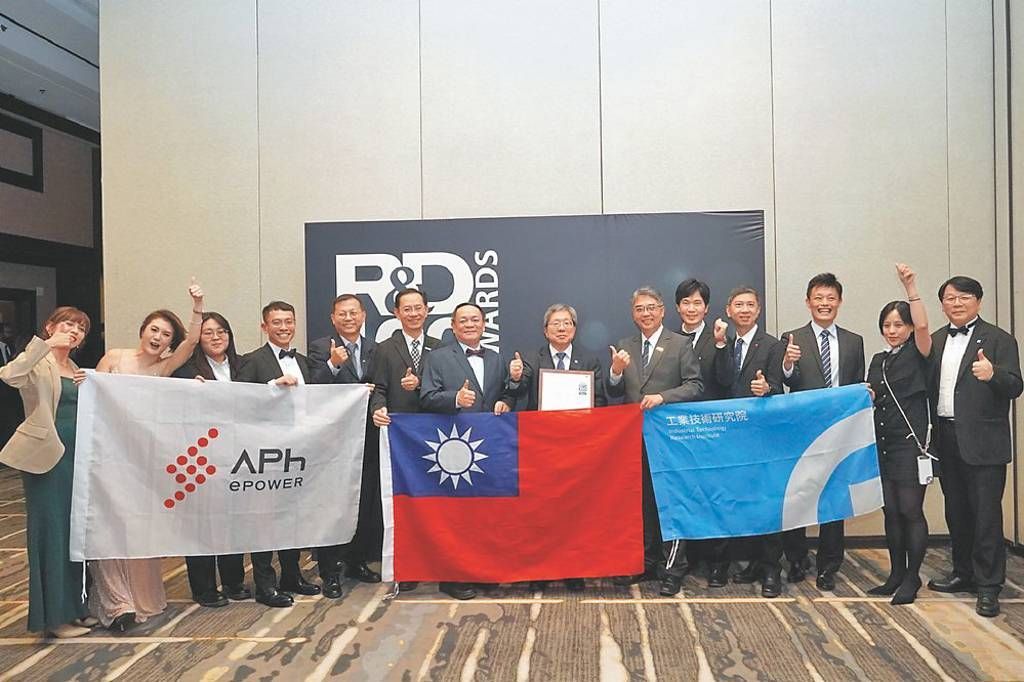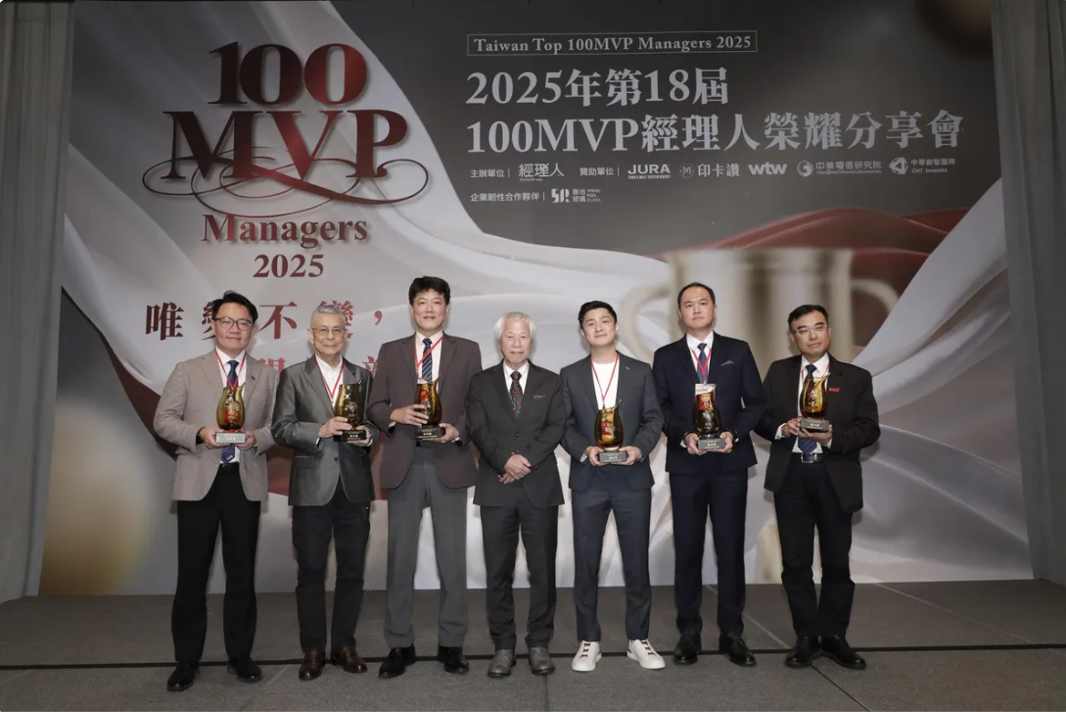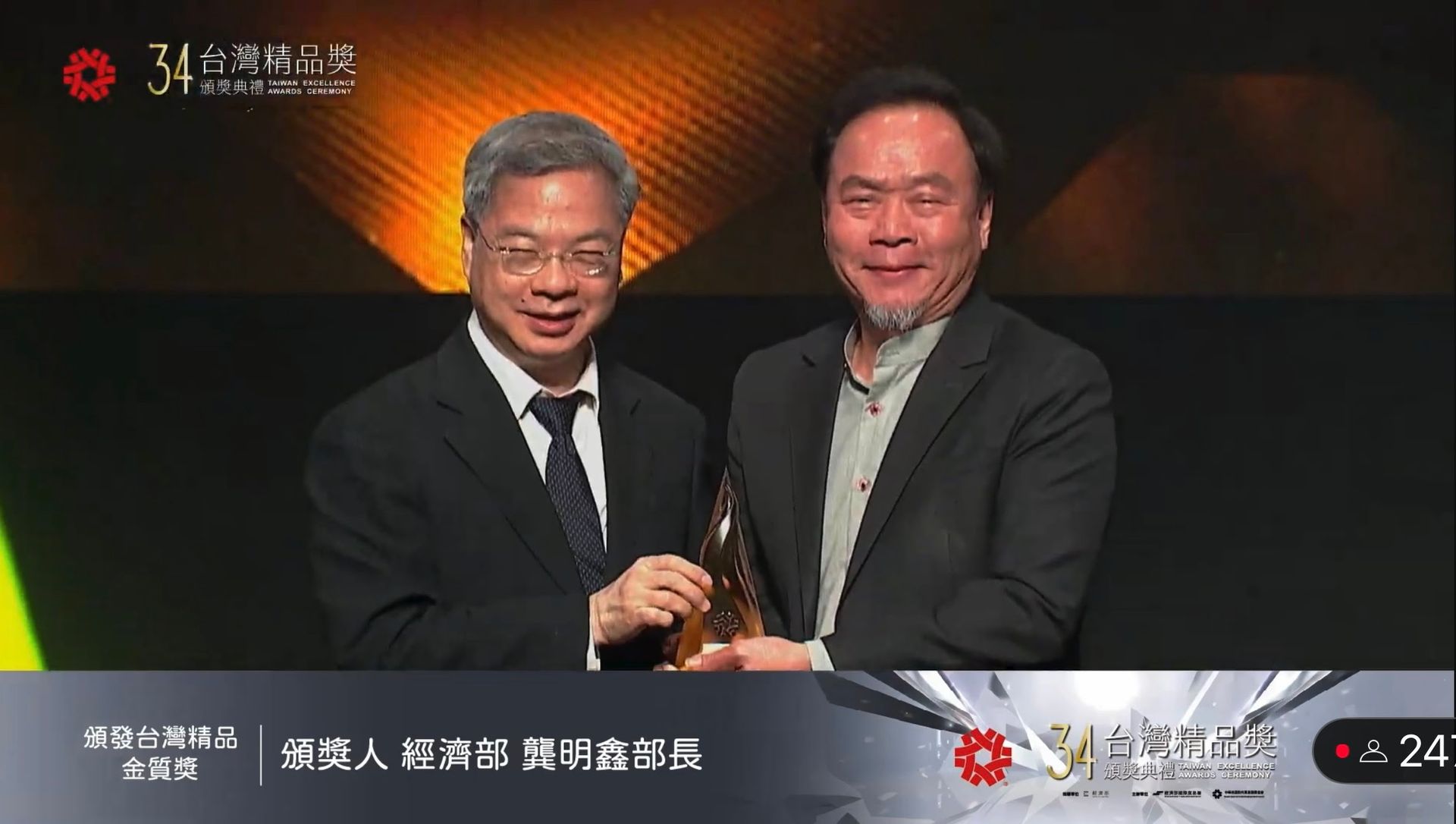TEBA
Okuma - Reshaped the Fishing Culture
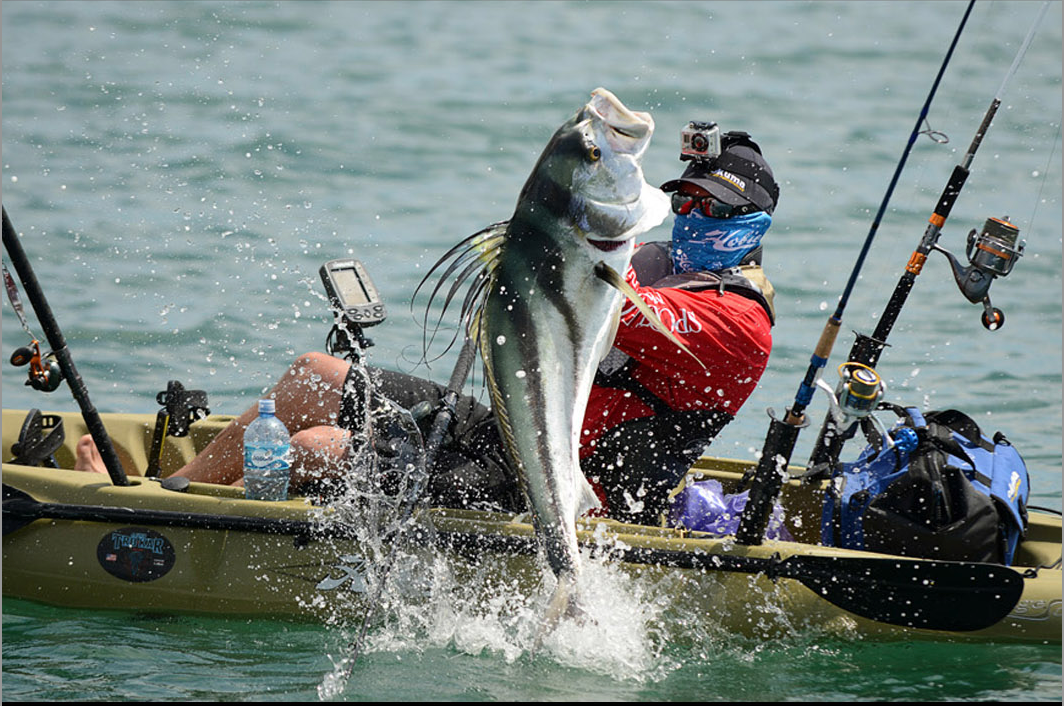
海釣和船釣是困難度較高的釣魚活動,也是寶熊企業精神的由來:Rising with every challenge(每一次拋投都是挑戰)。
2024.11.16
改變台灣釣魚文化的推手-寶熊漁具
Rising with every challenge-The Brand that Reshaped Taiwan’s Fishing Culture
「人生就像釣魚,每次拋投都是挑戰。」寶熊漁具憑藉釣魚人在海上拼搏的精神,30年間,從小小台灣企業,躋身全球釣具前三強。營收9成來自海外,寶熊仍心繫家鄉,成立漁樂碼頭推廣海洋教育、邀集產業夥伴打造友善釣魚環境。只因寶熊認為:「做到全球前三大,我有責任改變台灣的釣魚文化。」
"Life is like fishing - every cast is a challenge." With the fighting spirit of anglers at sea, Okuma Fishing Tackle Group. has grown from a small Taiwanese enterprise to the world's top three fishing tackle brand over 30 years. Although 90% of its revenue comes from overseas, Okuma remains deeply connected to its hometown, establishing Okuma Center to
promote marine education and bringing together industry partners to create friendly fishing environment. This is because Okuma believes that, "As one of the top three global fishing brands, I have the responsibility to transform Taiwan's fishing culture."
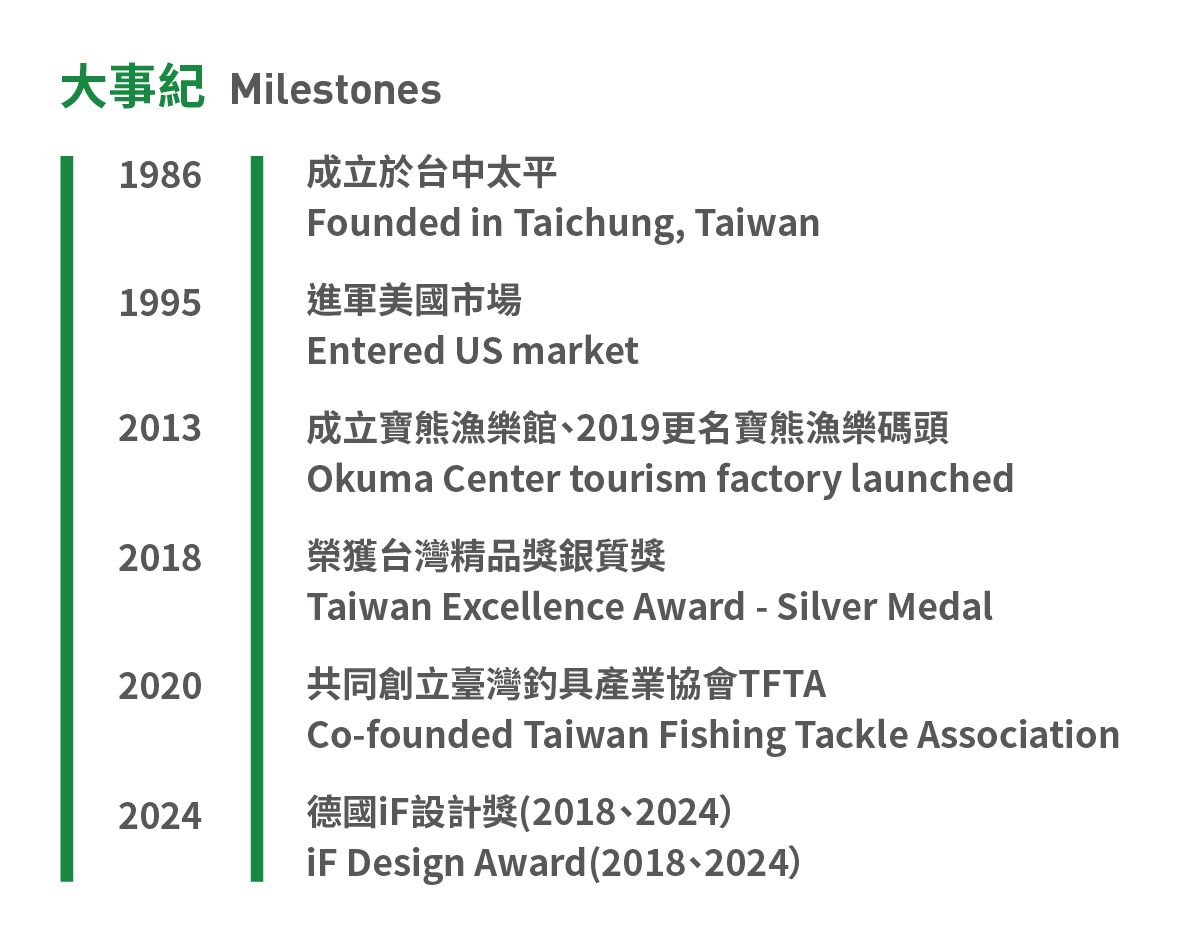
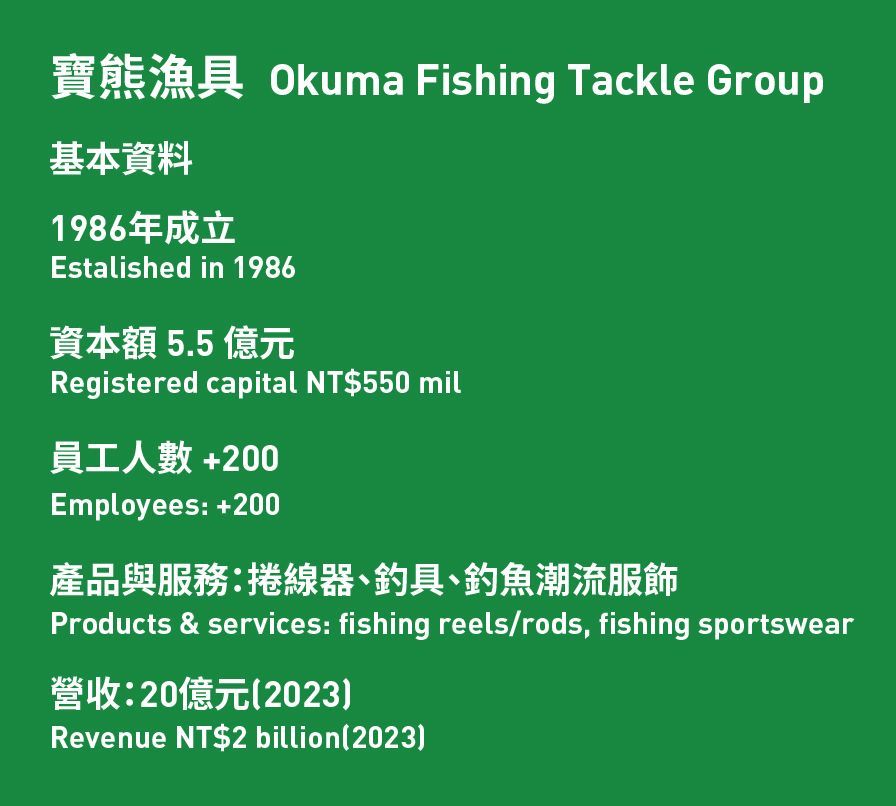
亞洲最大虛擬釣魚場 隱身台灣台中
Asia's Largest Virtual Fishing Venue Hidden in Taichung, Taiwan
「天啊!這條魚也太重了吧!」上百台斤的力量不斷向下拖行,將玻璃纖維製成的軟竿拉成彎月狀,不分男女、大夥伴齜牙咧嘴,跟螢幕中的巨鯰奮力搏鬥。但釣魚可不能只靠蠻力,必須仰賴捲線器「剎車」穩住釣竿,釣友一邊拔河、一邊調整力道,消耗大魚的體力才可能成功。
這處超逼真的虛擬釣場位於台中潭子,由全球Top 3的釣竿和捲線器製造商寶熊漁具10幾年前斥資上億,打造全球唯一的「寶熊漁樂碼頭」,館內不僅介紹漁類及海洋知識,還有各種釣魚體驗,不必出海也能實際感受。
走進「寶熊漁樂碼頭」園區,第一眼就看到巨無霸釣魚機,讓親子遊客體驗釣魚的快感,還能DIY魚拓明信片、學習製作魚飼料、動手做釣竿‧‧‧‧‧‧透過這些體驗活動,了解四面環海的台灣,擁有哪些豐富的海洋資源,藉此培養民眾對環境永續的認知。
「寶熊漁樂碼頭」成立十多年來,年年虧損,為何堅持繼續營運?董事長張良任說,是為了改變台灣的釣魚文化。「寶熊的市場超過九成在海外,來自台灣的營收僅不到一成。如果從營收穫利的角度來看,會覺得很傻。不過,今天寶熊已經做到全球第三,回頭看看家鄉,我覺得我有責任扭轉台灣的釣魚文化。」
“Wow! This fish is too heavy!” Hundreds of pounds of force are pulling downward, bending the fiberglass rod into a crescent. Men and women alike are gritting their teeth, struggling against the giant catfish on screen. But fishing requires more than brute strength; it also relies on the reel’s drag system to stabilize the rod. Anglers must engage in a tug-of-war with the fish, adjusting force to wear it out before they can reel it in successfully.
This ultra-realistic virtual fishing ground is located in Tanzih, Taichung and is part of the global-first
fishing theme park "Okuma Center". Registered as a tourism factory, it was built over a decade ago by the world’s top fishing rod and reel brand Okuma Fishing Tackle Group. With a multi-million-dollar investment, Okuma created an experience where people can fish without going out to sea and can quickly get the hang of it, even without prior experience.
Entering the "Okuma Center" complex, visitors are greeted by a giant fishing simulator. Families can not only experience the thrill of fishing but also make their own fish print postcards, learn to make fish food, try their hand at crafting fishing rods, and gain environmental sustainability knowledge about Taiwan’s rich marine resources.
Operating at a loss every year since its establishment over a decade ago, why does Okuma Center continue to serve hundreds of thousands of visitors annually? Charles Chang, Chairman of Okuma says it's to transform Taiwan's fishing culture. "Over 90% of Okuma’s market is overseas, with less than 10% revenue from Taiwan. From business perspective, it seems foolish to maintain Okuma Center. But I feel I have a responsibility to
change Taiwan’s fishing culture now that Okuma becomes the world's third-largest fishing gear brand.”
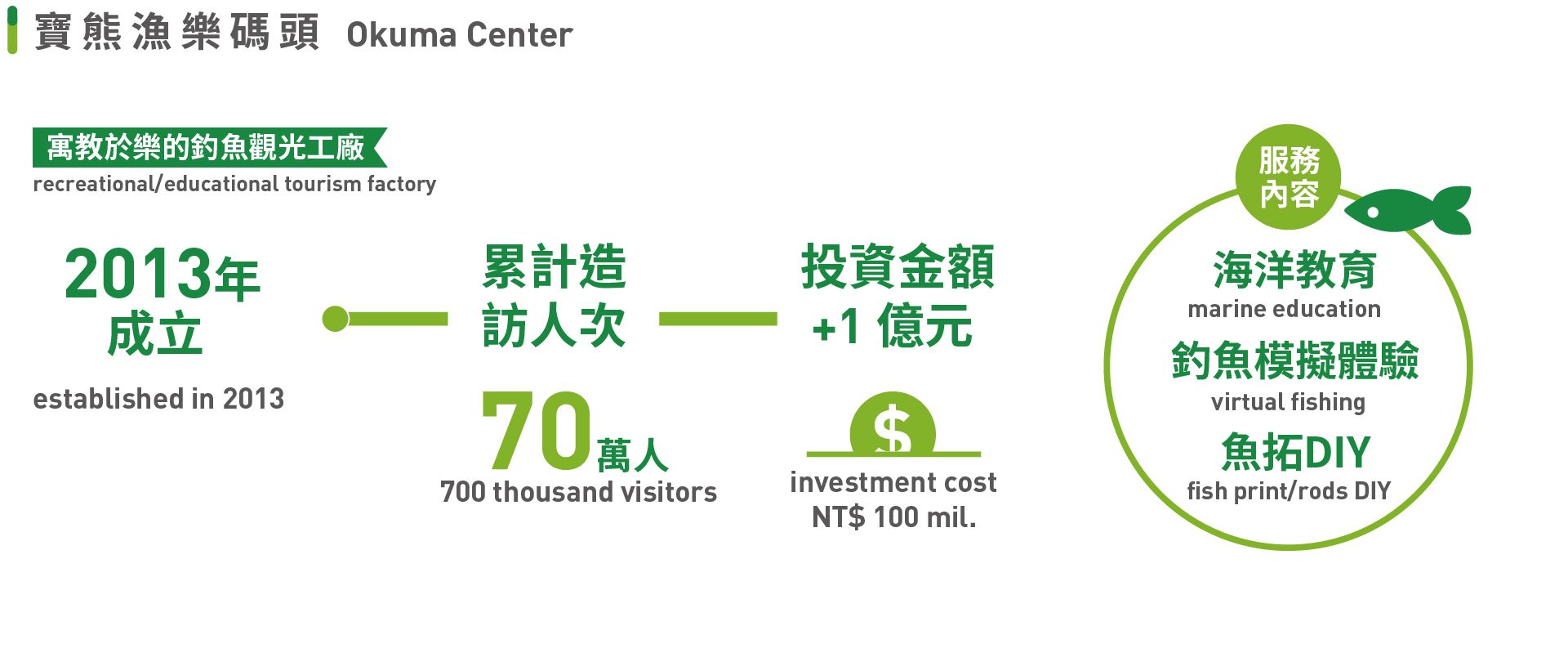
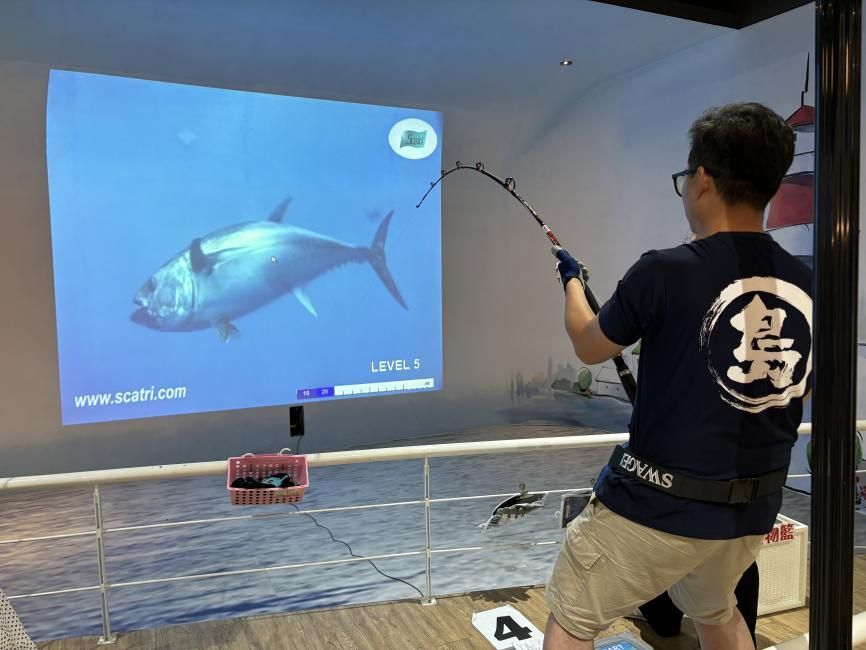
寶熊在漁樂碼頭內打造的巨型虛擬釣魚機,讓民眾體驗與巨型魚類拼鬥的感受。
去汙名化! 台灣釣魚人口10年翻倍
Reshape Culture: Fishing Population Doubles in 10 Years
在歐美及日本,釣魚是非常普遍的休閒活動,也是凝聚親子感情的橋樑。有一次,張良任到美國出差,客戶興奮跟他說,週末就要帶著六歲兒子第一次去釣魚,父子都期待了很久。在美國,休閒釣魚人口高達6000萬,超過高爾夫球和網球人口的總合,每年還有3萬到5萬場地方賽和巡迴賽,極具經濟規模。反觀台灣,由於早年戒嚴,禁止民眾靠近海岸,釣魚文化並不興盛,不僅釣點少、環境不友善,釣友也長期背負著破壞環境的惡名。
有鑑於此,寶熊雙管齊下,一方面透過漁樂碼頭,從學齡孩童開始培養正確的釣魚及海洋知識;另一方面也著手改善釣魚環境,結合民間釣魚團體,與政府溝通協調,開放並整建釣場,並成立臺灣釣具產業協進會,每年舉辦釣具博覽會,吸引海內外釣魚愛好者參與,為的就是改變大環境,讓更多人正確認識釣魚活動。
在產官學積極串連下,2020年行政院推動「向海致敬」,做為環境政策的一環,推廣友善釣魚理念,並陸續開放全台156個釣點陸續開放;經過多年努力,台灣釣魚人口已從10幾年前約60萬人,翻倍成長到如今的116萬人。張良任說,這並非寶熊的功勞,是大家一起努力的結果;但在許多人眼中,「寶熊漁具」的這些努力,已超越品牌經營,更像是充滿理想的社會運動。
In Western countries and Japan, fishing is a very common leisure activity and serves as a bridge for strengthening parent-child relationships. Once, during a business trip to the United States, Charles Chang visited a client, who excitedly told him about plans to take his six-year-old son fishing for the first time that coming weekend - something both father and son had been looking forward to for a long time. In the US, the recreational fishing population reaches 60 million, exceeding the combined population of golf and tennis players. There are also 30,000 to 50,000 local and touring tournaments each year, representing a significant economic scale. In contrast, fishing culture never flourished in Taiwan due to martial law in earlier years which prohibited civilians from approaching the coastline. Fishing spots were insufficient, the overall fishing environment was unfriendly; anglers have also long carried the stigma of being environmental destroyers.
To make a change, Okuma adopted a two-pronged strategy: providing fishing and marine knowledge to K9 students in Okuma Center; on the other hand, improving fishing environments by collaborating with civilian groups and governments to open up and renovate fishing spots. Okuma also established Taiwan Fishing Tackle Association, organized annual fishing gear expo that attracts enthusiasts from home and abroad. All these efforts aim to change the broader environment and help more people correctly understand fishing activities.
With collaborative efforts from government, industry, and academia, Taiwan’s central government introduced the
“Respect the Ocean”
initiative in 2020 to promote responsible fishing, complemented by opening 156 fishing spots nationwide. This has helped Taiwan’s fishing population grow from about 1 miilion to approximately 2.3 million in over a decade. Okuma's initiatives go beyond branding;
it’s almost a social movement, embodying concrete ESG (Environmental, Social, and Governance) practices.
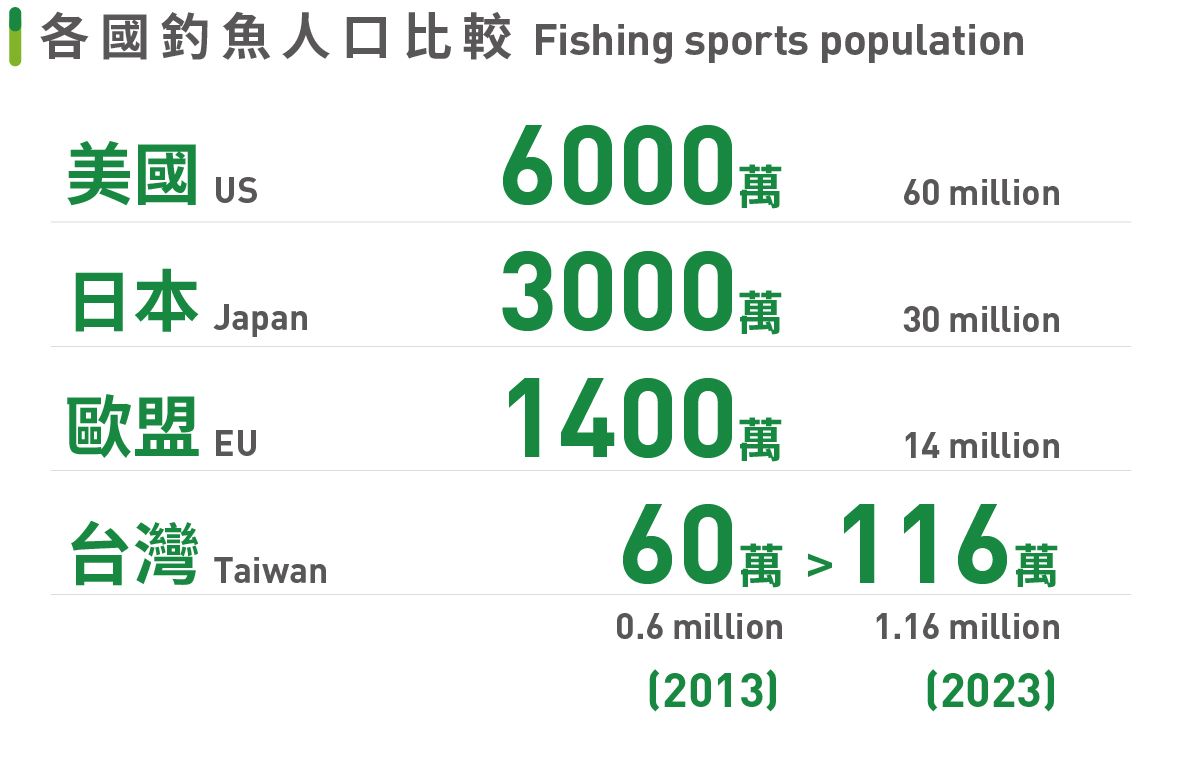
寶熊漁樂碼頭經常舉辦各種趣味活動,讓民眾深入了解海洋教育和釣魚知識。
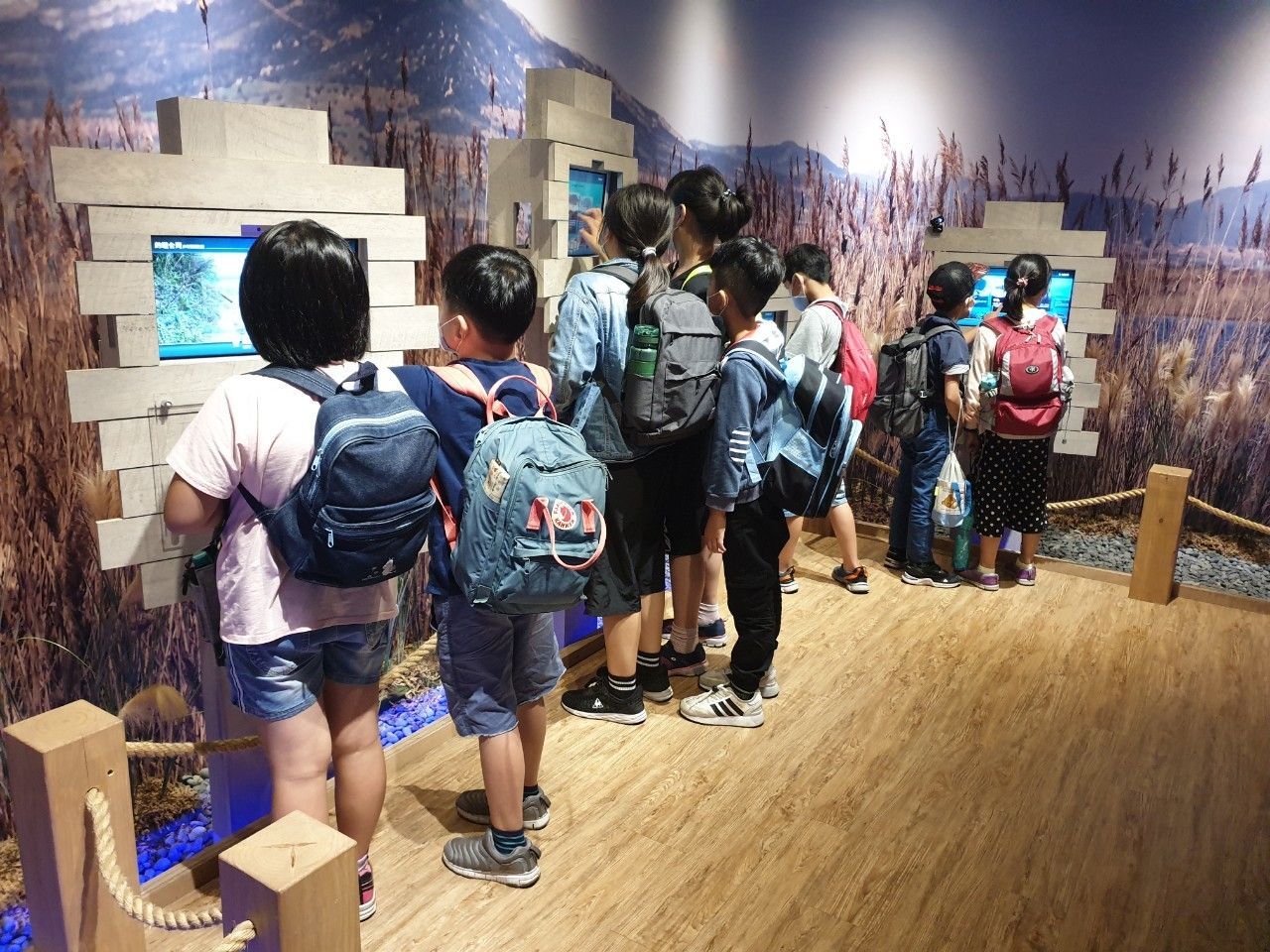
國小學童參觀釣魚故事館,寶熊希望建立健康的釣魚文化,從小開始紮根。
隱形冠軍! 30年成為頂尖釣具品牌
Hidden Champion! 30 Years’ Effort to Become Top Fishing Brand
「寶熊漁具」的品牌故事,本身就是一場勵志的拼搏。今天,Okuma在全球釣魚界無人不知,已成為高階捲線器的代名詞,這是花了30年的努力。早期從事網版印刷的張良任,因為熱愛釣魚,即使當時台灣產業一片外移浪潮,他仍毅然於1986年與朋友合資100萬資本額創業。
公司草創初期,接的都是代工訂單,然而競爭者眾、突圍難度高,張良任深知單純代工無法長久,決定自創品牌Okuma。kuma在日文中是「熊」,O則有讚嘆之意,他期許品牌就像最會抓魚的北極熊,在艱困環境下仍能勇闖難關。堅持這樣的品牌精神,張良任一邊接代工、一邊默默研發,在大廠不重視的小型市場試水溫,產品好用又經濟實惠的口碑建立後,終於吸引大廠的目光。
Today, the brand "Okuma" is widely recognized in the global fishing society, where it’s synonymous with high-end reels. Charles Chang, who initially worked in screen printing, loved fishing and defied the trend of Taiwanese industry offshoring by co-founding the company with NT$1 million in 1986.
In its early days, the company focused on OEM orders, but
Zhang realized pure OEM would not sustain the business. Thus, he created the Okuma brand: "Kuma" means "bear" in Japanese, while the "O" conveys admiration. He envisioned his brand as a polar bear, adept at catching fish and resilient against adversity. True to the brand spirit, Zhang continued accepting OEM orders while quietly developing his own products. His quality, affordable products began gaining traction in smaller markets, eventually attracting attention from major brands.
唯一成功插旗美國的外國品牌
The Only Foreign Brand Established Foothold in the US
「寶熊漁具」靠著不斷創新設計,小小品牌卻擁有優等品質,培養出一批不同的消費客群,讓當時歐洲最大釣具廠、德國日品牌DAM找上門。經由長期合作,「寶熊漁具」成為DAM主要代工廠,在市場打開知名度。也因為深知歐洲對產品規格的要求,「寶熊漁具」逐漸把自有品牌Okuma的歐洲版圖做大,開始引發德國品牌廠疑慮,威脅抽單。
為了分散歐洲風險,「寶熊漁具」在美國市場的布局必須加快進行,1995年張良任遠赴美國西雅圖設立分公司,然而當地長期由日本廠商稱霸,業績遲遲不見起色,3年後張良任決定親自督軍,大打價格戰和「永久免費維修」策略,硬是在銅牆鐵壁的通路中殺出一條血路。經過6年持久戰,Okuma開始轉虧為盈、業績翻倍成長,成為日系品牌之外,唯一成功插旗美國的外國品牌。後來受惠於美國市場挹注,降低了德國客戶中止OEM對「寶熊漁具」的衝擊。
With its continuous innovation and quality, Okuma cultivated a unique consumer base and eventually caught the attention of DAM, Germany’s largest fishing tackle brand at the time. This partnership boosted Okuma’s reputation, as they became a key OEM for DAM. Knowing the high product standards in Europe, Okuma gradually expanded the reach of its brand in the European market, raising concerns among German brands about losing exclusivity.
To mitigate the risks in Europe, Okuma accelerated its expansion in the U.S. market, establishing a Seattle branch in 1995. Facing intense competition from established Japanese brands, Zhang decided to step in personally after three years, initiating a price war and offering a
“lifetime free repair” strategy to carve out market share. After a six-year struggle, Okuma turned profitable, with sales doubling, becoming the only foreign brand to establish a foothold in the U.S. fishing market alongside Japanese brands. This success cushioned the impact of any OEM withdrawal from German clients.
行銷90餘國 推動ESG不遺餘力
Okuma in +90 Countries; ESG initiatives launched
歷經近40年跌宕起伏,「寶熊漁具」如今在台灣市佔率高達40%,行銷全球超過90國,年營收突破20億,晉身全球第三大釣具及捲線器大廠。不過張良任不以此自滿,除了持續追求產品技術創新,在推動企業ESG的作為上更是朝高標準看齊。
張良任表示,目前「寶熊漁具」已組成ESG推動小組,讓同仁逐漸瞭解ESG內涵,為了加深落實程度,公司內部也設計了「ESG大富翁」活動,鼓勵同仁多搭乘大眾運輸工具、走樓梯取代搭電梯,甚至是攜帶環保餐具,都可以集點換小禮物。
國際間高度重視的減塑議題,寶熊也響應支持。今年開始,新產品的塑膠包裝材料退場,改為可回收或可分解的紙材料。張良任分享,紐西蘭代理商去年也發起貝類復育的行動倡議,鼓勵消費者購買掛有黃金貝卡片的Okuma釣具,便提撥營收一定比例,捐給貝類復育機構,消費者還能拿到小禮物。張良任表示,未來「寶熊漁具」將結合各國代理商的力量,推動更多與ESG相關的行銷活動,讓消費者意識到海洋生態重要性。
After nearly 40 years of ups and downs, Okuma now holds a 40% market share in Taiwan, markets its products in over 90 countries, and generates annual revenue exceeding NT$2 billion, ranking as the world’s third-largest fishing rod and reel manufacturer. But Charles Chang isn’t content with this; beyond pushing for product innovation, he’s also setting high standards for the company’s ESG initiatives.
According to Change, Okuma has established an ESG task force to help employees understand ESG principles. To encourage sustainable practices, the company also introduced an “ESG Monopoly” game, rewarding employees for taking public transportation, using stairs instead of elevators, or bringing reusable utensils.
Furthermore, responding to international clients’ concerns about reducing plastic, Okuma replaced plastic packaging materials for new products with recyclable or biodegradable paper materials this year. Zhang shared that last year, Okuma’s New Zealand distributor began a shellfish restoration initiative, encouraging consumers to buy Okuma fishing gear with golden shell tags, with a portion of proceeds donated to shellfish conservation organizations. Consumers also receive a small gift. Going forward, Okuma plans to collaborate with its international distributors to launch more ESG-related campaigns, raising consumer awareness of the importance of marine ecosystems.
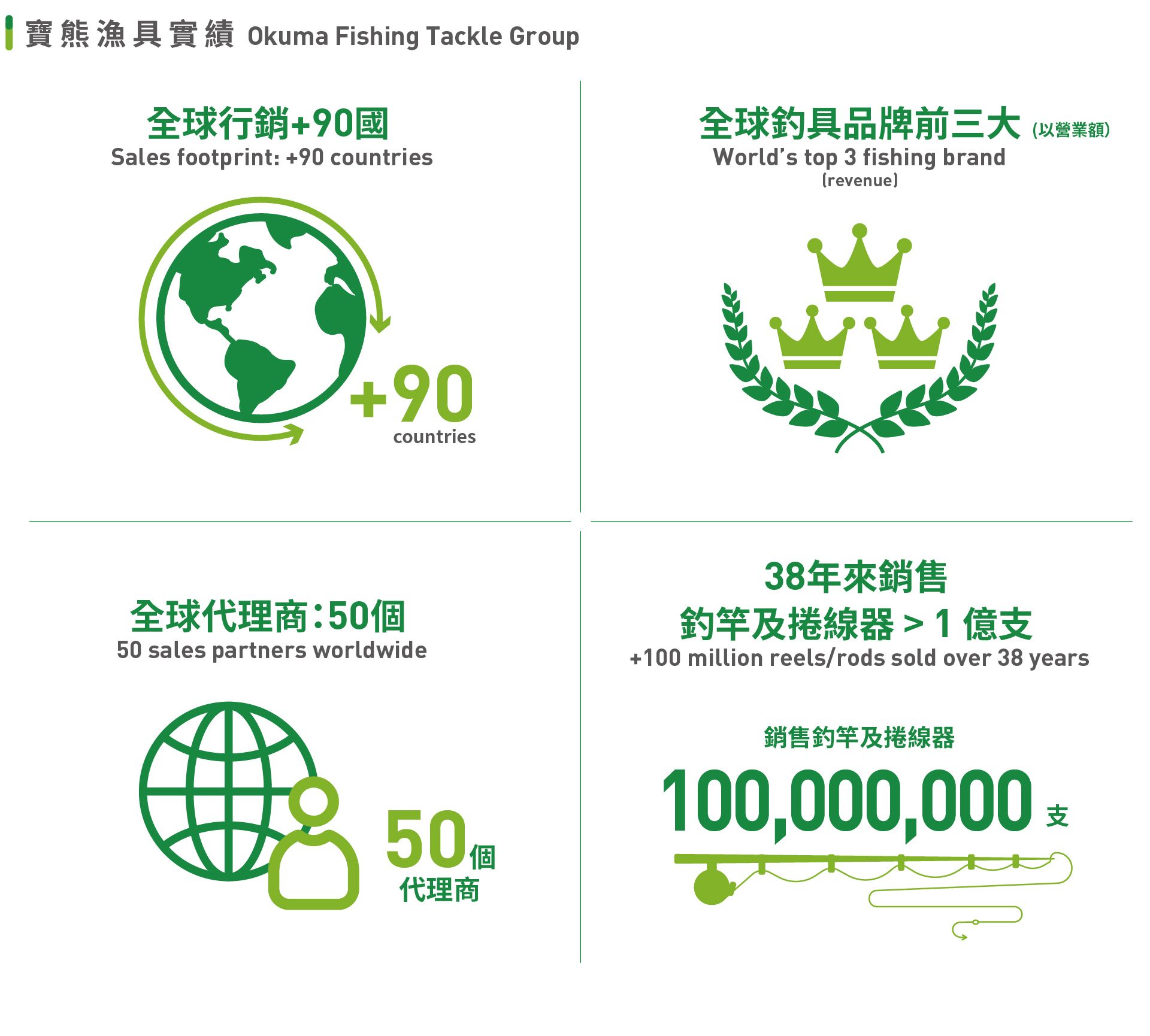
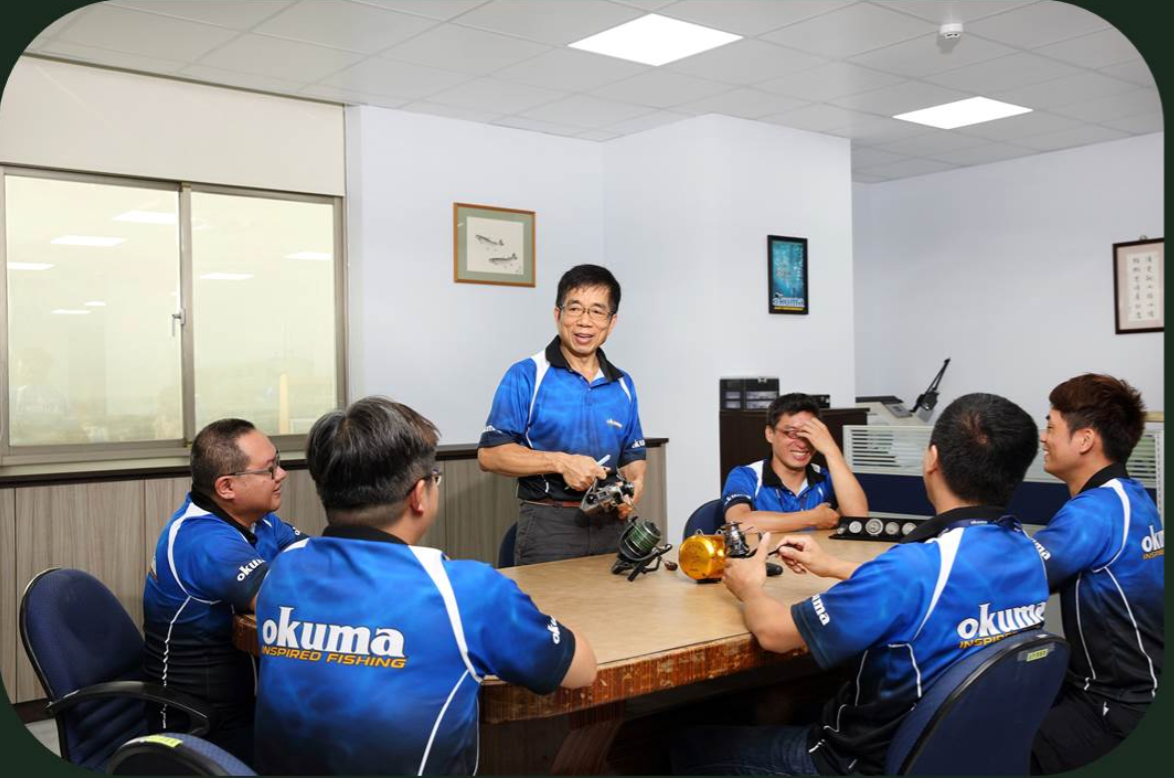
寶熊漁具鼓勵員工創新思考,研發更符合市場需求的捲線器。
撰文:TEBA 台灣精品品牌協會
Written by TEBA(Taiwan Excellent Brand Association)
contact TEBA for more Taiwan brands: jennylo@teba.org.tw

